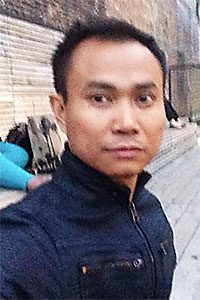
At a time when "people from the same camp" broke a principle he said he once believed in, Wanchai Sornsiri, a member of the National Reform Steering Assembly, seems to believe that silence is golden.
He has kept quiet over excessive non-attendance during sittings of seven members of the National Legislative Assembly (NLA), even though he was earlier a staunch critic of former premier Yingluck Shinawatra for her similar behaviour. Netizens have begun to question why this man of good principle hasn't stood his ground this time.
But he is not alone in harbouring criticism against the military-appointed lawmakers. NLA chief Pornpetch Wichitcholchai and Deputy Prime Minister Prawit Wongsuwon also defended the seven men including the prime minister's younger brother and former permanent secretary of defence, Gen Preecha Chan-o-cha.

Surasak Glahan is deputy oped pages editor, Bangkok Post.
Would they offer the same treatment if the rule breaker were Yingluck, many social media users asked? Where are those protesters who once attacked the former premier for missing parliamentary sessions, they wonder?
Gen Preecha's excessive leave from work has not received very intense scrutiny from the public or the media. The latter have been busy with mobilising their resources and providing space and air time to the government's search operation for the embattled former abbot, Phra Dhammajayo. Other previous allegations against Gen Preecha, which includes the story that his son was awarded contracts by the military and that the value of his extravagant home has been undeclared seem to have been forgiven, if not forgotten, by the urban, pro-establishment political activists who protested in the streets against Ms Yingluck prior to the 2014 coup.
It is not just Gen Preecha who appears to have wriggled out of trouble. Other several controversial acts and decisions by the military government have escaped criticism by the pro-establishment group who supported the army's rise to power. However, it hasn't been much different for staunch supporters of ousted premier Thaksin Shinawatra as well. When Thaksin faced allegations of fraudulent tax evasions and several policies that allegedly favoured his then business empire over 10 years ago, his supporters and MPs threw their unconditional support behind him.
But this sort of behaviour, or camaraderie if you like, is how many of us act day to day. We tend to be more compromising and inclined to turn a blind eye to things we normally disagree with or disapprove of if they are done by our people or our friends.
Does that notion have something to do with the unresolved political turmoil of the past decade which has trapped us in a clash of political ideologies that pits the anti-Thaksin camp against Thaksin supporters? Maybe it does. Having covered street protests from both sides, I heard protest leaders hurling vitriolic language at individuals, attacking them personally rather than politically.
If we want to assuage the prolonged political conflict, if not resolve it, we may need to accept that misdeeds can be carried out by our preferred leaders. And if we want a transparent and accountable government, we may need to place our hopes and trust in sensible principles, rather than "good people".
Take a look at the current regime's record of lavish spending on several megaprojects, its populist policies, the alleged kickbacks involving the construction of the Rajabhakti Park in Prachuap Khiri Khan and the potential 13.5-billion-baht procurement of a Chinese-made submarine. Those who would have otherwise protested against such decisions if they were made by the Thaksin or Yingluck governments have remained less critical of the military. Most Thai media, as staunch critics of Thaksin and his cronies, have not made efforts to scrutinise or question this government.
It may have something to do with the preference they have for this regime, the "white knights" who saved Thailand from "corrupt and abusive" governments.
Recently, many who support the military government have started to get a bitter taste of their own making. Some of them feel that they have been betrayed by the government's decision to approve an inter-governmental proposal to remove the Mekong River's outcrops and rapids and the cold-fired power plant in Krabi.
Times will only get more challenging and political reconciliation more elusive if we refuse to acknowledge that our "heroes", our people and our governments need to adhere to universal principles and should be held accountable if they break them.
